Bringing home a new puppy can leave you tossing and turning in excitement or sleepless for a less pleasant reason: whining.
Unending, incessant, maddening whining.
Thankfully, these long, restless nights can be a thing of the past with adjustments to your pupper’s routine.
We’ll explain why puppies may whine at night and how you can help your fur kid sleep soundly below.
How to Stop a Puppy from Whining at Night: Key Takeaways
- Nighttime whining is a pretty normal part of puppy development. Your crying puppy isn’t being “bad” or acting out; she’s either going through another mutt milestone or she’s simply uncomfortable for some reason.
- In some cases, a vet visit may be warranted. Nighttime crying can be a sign of pain or illness requiring veterinary care, so – like many other pooch problems – a discussion with your vet is a good first step.
- Adjustments to your puppy’s routine can help quiet healthy pups. Though you may need to do a bit of trial and error, whining at night often has a simple fix, such as changing your puppy’s feeding, pottying, or exercising schedule.
Why Do Puppies Whine at Night?
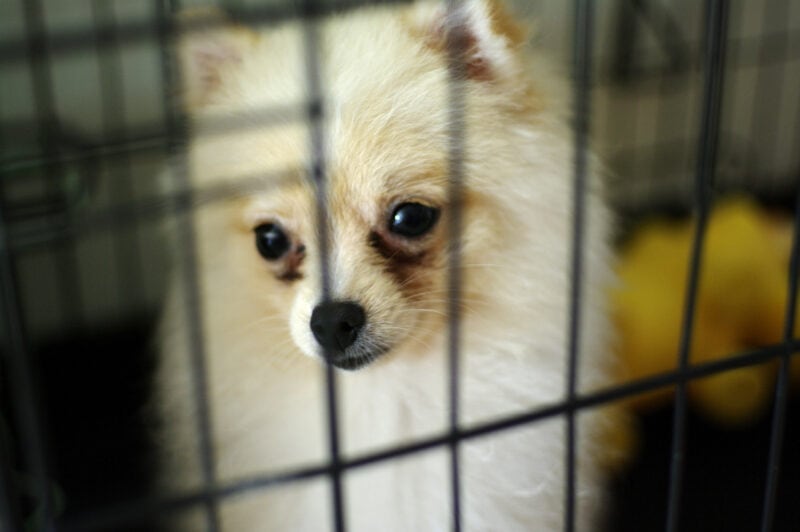
Whining is one of many things to expect when getting a new puppy, but deciphering why your puppy is whining can be tricky, particularly if you’re unfamiliar with dogs.
Sometimes it’s easiest to understand the cause of a behavior by considering your puppy’s point of view.
Picture it: You’re playing with your mom and siblings when a stranger arrives and takes you away to a new place. All the while, you have no idea what’s happening since the stranger speaks a language you don’t understand. Then, once it’s dark, you’re left alone in this weird realm, probably in a crate.
Welcome to the life of a puppy.
A little whining is understandable, no?
But aside from the general disruption and change in her life, other things can also lead to whining as your new pup adjusts to living with your family.
Puppies may cry at night for several reasons, including:
Fear
Your puppy may simply be crying out at night because she’s scared.
A puppy’s life is full of scary moments as she goes through a flurry of firsts: her first night in a new home, her first car ride, her first vet visit, etc. Uncertainty and fear go hand in hand, particularly with a puppy still learning about the world around her.
Outside of being fearful during her first night at home, your puppy will also experience fear periods as she grows, potentially leading to nighttime crying.
These scaredy-cat spells can be disruptive, but they’re a normal part of canine development. Most puppies experience fear periods twice – once at 8 to 10 weeks of age and a second one at 6 to 14 months. Each fear period lasts about 2 to 3 weeks before fading.
Hunger
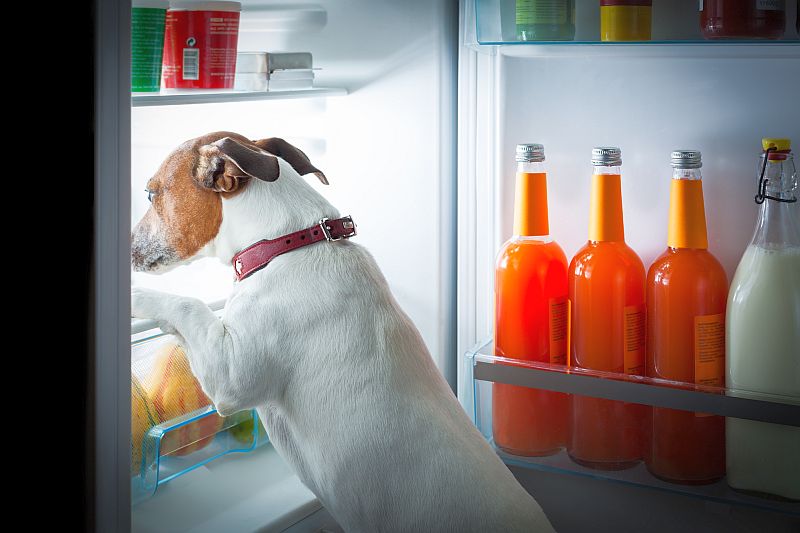
Your puppy’s after-hours racket may signal she’s hankering for a snack.
Puppies often have impressive appetites, and before switching to puppy food, your puppy most likely had all-you-can-eat access to her mama’s milk.
Now she’s adjusting to eating on a schedule that can come with some hiccups as you figure out how much and how often she needs to eat.
Pain
No one wants to think of a canine in pain, but it’s a possibility, especially if your puppy’s cries are piercing or distressed in nature.
The reason may be as minor as your puppy getting her paw stuck between crate bars and panicking or as serious as an illness or injury.
As with babies, pained cries in puppies differ in sound from run-of-the-mill whining, allowing you to jump into action quickly.
Need to Potty
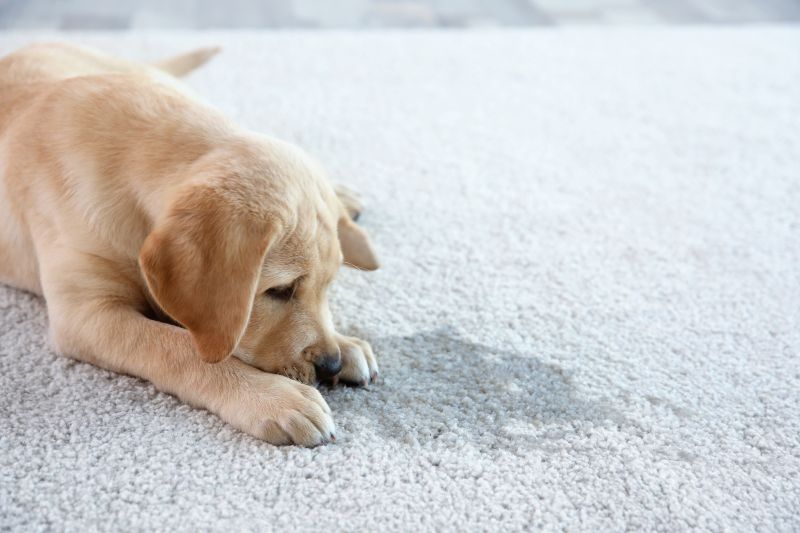
Puppyhood comes with the joys of housetraining, which can make bedtime tricky as you and your new friend learn her bathroom needs and habits.
Sometimes, puppies are too focused on play and don’t “empty the tank” entirely before bed, leading to nighttime whining once the call of nature hits. Other times, something might disagree with your puppy’s tummy, leading to a desperate need to potty.
Discomfort
Nothing is worse than being unable to find a cozy spot in bed, and your whining woofer may be experiencing that in doggo form.
Her sleeping space may not be up to snuff, whether her bed’s uncomfortable, her crate is too small, or the temperature is too hot or cold. Her nighttime crying might be her way of saying, “Hey, I don’t like this!”
Boredom

Your puppy’s late-night noisiness may boil down to plain old boredom.
Settling in for the night to catch some Zs isn’t every puppy’s idea of fun. Your four-footer may decide that canine caroling at midnight is way more enjoyable than simply going to sleep. Whining may also be her way of saying, “Come play with me, mom!”
Anxiety
Anxiety is a relatively common canine problem that can disrupt your dog’s sleep schedule. It comes in various forms, from general anxiety to noise-based fear to separation anxiety. The condition can lead to restlessness, increased whining, and difficulty sleeping.
In extreme cases, anxiety may even cause dogs to resort to self-harm. This may take the form of incessant chewing or lickings at their paws or tail.
Crate Aversion
Crates aren’t every puppy’s favorite at first. Some may find these doggo dens to be more like pupper prisons and say as much with nighttime crying. Proper crate introduction and training go a long way in preventing these sad serenades.
How Can You Stop a Puppy from Whining at Night?
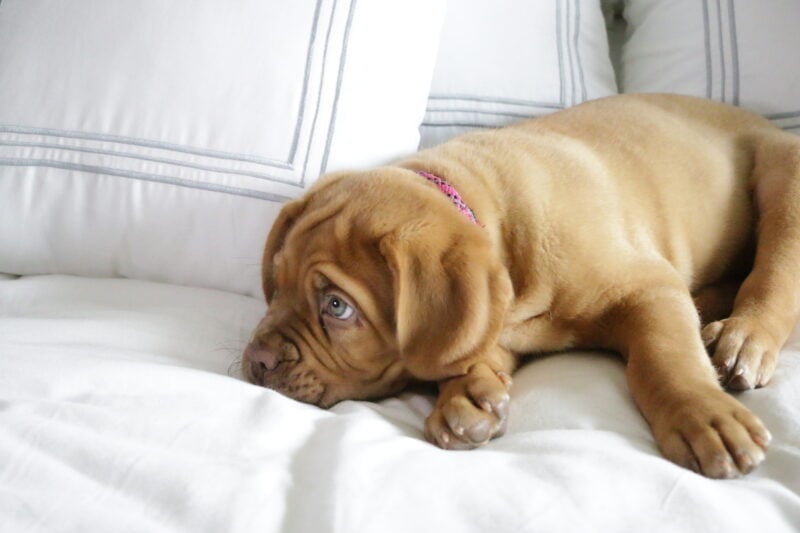
Thankfully, there are ways to ease bedtime whining to get you and your puppy sleeping through the night again. Most are minor adjustments that won’t break the bank, either.
1. Check Your Puppy’s Sleeping Space
Your first step is to ensure nothing in your pup’s sleeping space is bothering her. Did her bed flip over at a weird angle? Is your cat pestering her? Did she spill her water bowl?
Depending on the details of your household, there are many things that could make your little one uncomfortable.
Always investigate unexplained whining to see what’s going on!
2. Make Sure You’re Using the Right Crate for Your Pup
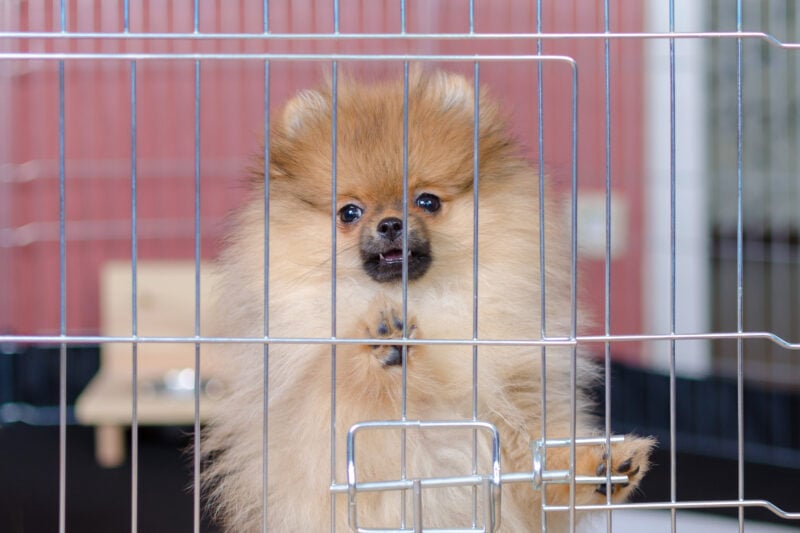
No one wants to sleep in a space that’s too small, and your puppy is no different.
An appropriately sized crate will allow your dog space to stand, turn around, and lie in her desired sleeping position without feeling cramped.
The best crate for your puppy should have a divider, allowing you to expand the interior of the kennel as your pup grows, giving her enough room to be comfortable while still preventing giving her too much space (which may make her willing to relieve herself inside it).
Dividers are essential for large-breed puppies that grow quickly, as this rapid growth can leave you scrambling for replacement crates, which can get super pricey.
Another canine containment option is a dog playpen. This set-up can be less anxiety-provoking for stressed-out pups. These are best suited for small puppies, as larger woofers may simply topple them over. They’re also not a good idea if your puppy is a climber.
3. Work on Crate Training
Crying at night in a kennel can signify that you need to work on crate training basics.
You want your puppy to view her crate as a resting place, not a punishment.
This means following an appropriate schedule surrounding when and how often she’s crated.
Other than at night, dogs shouldn’t be kenneled for hours at a time. A crate should be linked to positives, too, such as receiving a treat or gnawing a yummy chew when your puppy enters.
4. Play Crate Games with Your Puppy
Crate training games make your puppy’s pen more familiar, reducing fear and anxiety surrounding the space.
Over time, these fun activities help your puppy view her crate as a safe space where she can hang out to relax. This can be especially helpful at nighttime and when you need quiet, as it signals that her crate means “calm.”
5. Adjust Your Puppy’s Feeding Schedule

For late-night whining tied to hunger or even a need to potty, changing your puppy’s feeding routine can help. These adjustments help keep her satiated through the night and can also avoid those dreaded midnight bathroom breaks in your robe and slippers.
With suspected hungry criers, you want to first look at what you’re feeding your pup. Is it a high-quality puppy food?
If your puppy’s food is fine, you must look at her portion size. Are you feeding your puppy enough?
If you’re unsure, reach out to your vet to ensure you’re not under or overfeeding your puppy. Your vet can recommend the proper amount you should be offering your dog at each meal and discern if your puppy’s hunger is unusual.
When meal portions aren’t a concern, study your puppy’s feeding schedule. Is she eating supper too early in the day? This can leave her tummy rumbling for food long before breakfast, resulting in those sad cries. Sometimes, feeding your puppy a small treat before bed can help ward off late-night hunger.
At the same time, feeding your puppy too much food or feeding her too close to bedtime can result in nighttime whining for a potty pitstop.
6. Give Your Puppy Something Comforting
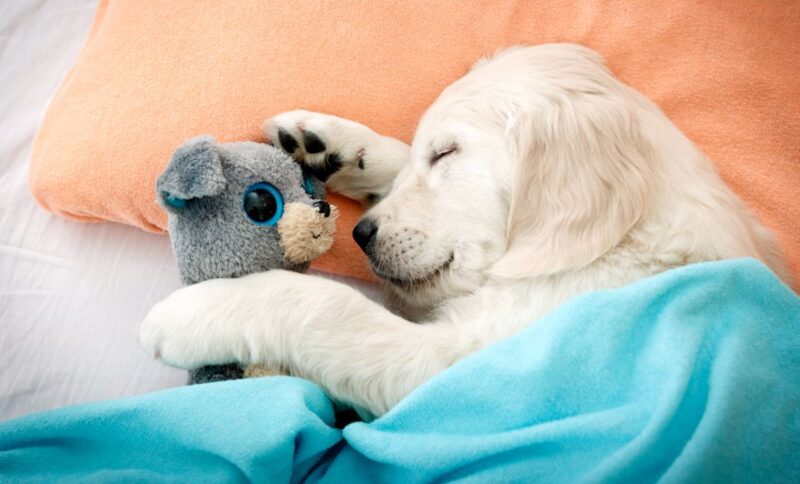
Sometimes all your puppy needs is something that makes her feel less alone at night, like a blanket or t-shirt with your scent on it. Ideally, this should be an object you’ve slept with to make sure it’s nice and saturated in your smell.
In other cases, an anxiety dog toy like a plushy is a great pick.
What exactly you’re offering your pup varies by her behavior. For instance, you don’t want to give a plush toy to a super chewer, and you don’t want to give a shredder a blanket.
And if your dog ingests objects, this is a step you should skip for safety’s sake.
7. Adjust Your Puppy’s Bathroom Break Schedule
Take your puppy outside to potty as close to bedtime as possible, and make sure she actually relieves herself.
Puppies have a knack for goofing off instead of doing their business!
To keep her on-task, avoid talking to her while she’s sniffing out the perfect spot and never bring toys on canine bathroom breaks.
It also helps you track how often your puppy does her business, particularly when she poops, as not every bathroom break results in doggy diamonds. Keeping tabs on her bathroom habits spot issues, too, such as peeing too much.
Remember that young puppies need a nighttime potty break, as their little systems can only store so much for so long.
This will be part of your routine for the first few weeks but can be limited to just one late-night adventure if your puppy relieves herself before bed and doesn’t tank up on food or water.
8. Offer Your Puppy Toys to Play With
Puppies who cry out of boredom may need something to entertain them until they hit the hay. A durable toy can be a quick fix, occupying her time and tiring her out while keeping her quiet and allowing everyone else to sleep.
Since your pupper will be alone during play, choose a toy that’s not a choking or ingestion hazard, such as a KONG.
Interactive dog toys are another hit since many of them are designed for independent play. On the flip side, you want to skip squeaker toys unless you don’t mind the occasional squeak at 3:00 AM.
9. Give Your Puppy a Safe Chew
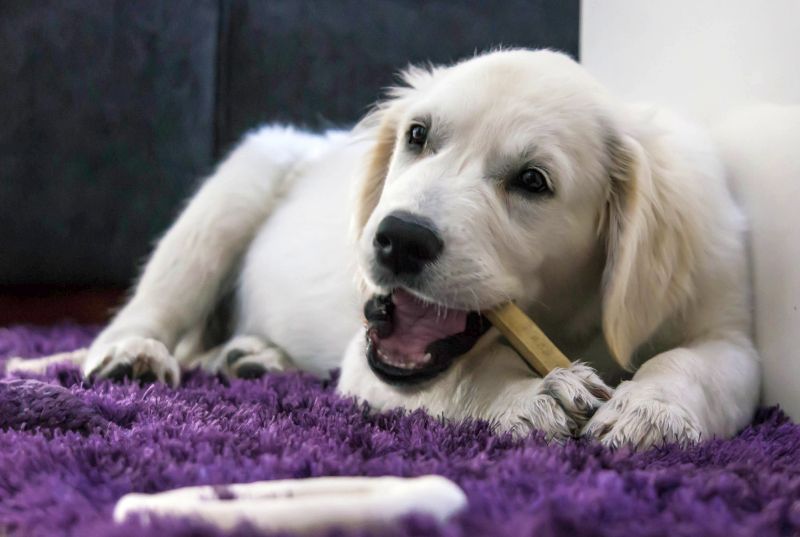
A bored puppy may also benefit from a long-lasting dog chew to get her through the night.
This gives her a healthy outlet for all that energy and something to focus on until she tires out. As a bonus for you, it should also keep her quiet.
For safety’s sake, the chew should be large enough that your puppy can’t fit it in her mouth, durable enough that she can’t bite off pieces, and capable of passing the fingernail test to prevent tooth damage (you should be able to dent the surface with your fingernail).
Check out our list of the best chews for teething puppies for some top-notch examples!
10. Wear Your Puppy Out
With proper physical and mental exercise, a puppy should be tuckered out come bedtime.
If your puppy is still raring to go when the sun goes down, it’s time to look at her daily routine and see where you can add canine enrichment activities to properly wear out your pup.
Daily walks are a great idea, but there’s a good chance that these walks aren’t stimulating your dog’s mind. Try out walking games to put your puppy’s brain to work too!
Your dog’s daily enrichment needs to be varied from puppyhood through her senior years.
Day-to-day training makes up a portion of this, but your puppy needs to use her brain in other ways, like sniffing out goodies on snuffle mats, digging in a dog-safe area, or playing dog training games that make learning the basics fun.
It’s important to note that not every exercise is safe for every puppy. Breeds with long, low builds like dachshunds and basset hounds shouldn’t jump onto or off of high surfaces, and large and giant doggos shouldn’t be jogging companions. Always ask your vet what exercises are safe for your dog.
11. Use a Crate Cover
The world around your pupperino may be the cause of her canine cacophony. Things like lights, shadows, and even oddball items in the dark can lead to excessive whining or barking.
Using a breathable crate cover is an easy way to block out these nighttime distractions.
These covers are made specifically to be lightweight enough to let air in yet still transform your pup’s pen into a cozy den free of spooky shadows. Pay attention to thickness, however, as insulated kennel covers aren’t meant for indoor use. They can overheat your pup!
Sometimes a well-folded sheet can be used, but we’d skip these and blankets, as puppies tend to pull them into the crate and make a mess of them. They can also become safety hazards.
12. Move the Crate Closer to You (or Farther Away)
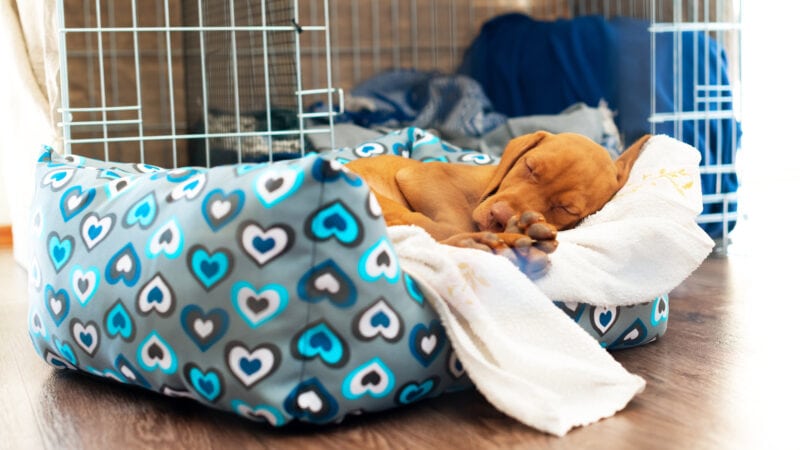
Sometimes, relocating your puppy’s kennel soothes nighttime crying. Puppies may cry because they’re in unfamiliar areas or are distressed because they can’t see you.
If your puppy is in a seldom-used area, move the kennel to a comfortable space for her where she can keep visuals on you, such as the family room or kitchen. These places are full of familiar sights, sounds, and smells.
At night, consider moving the crate into your bedroom or closer to your bed. For many pups, just being a little closer to you will help put them at ease.
13. Add Some Background Noise
The unexpected sounds around your house at night might be behind your puppy’s whining. Radiators, air conditioners, and refrigerators can be terrifying to a little puppy.
Similar to calming a dog during fireworks, you want to counteract these with a less scary sound, like leaving a television or radio on low near your pup’s crate. You can also try a white noise machine!
14. Sleep Aids & Relaxation Supplements
You can also help a puppy struggling to settle in with aids like calming dog collars and plug-in adaptil diffusers.
These drug-free solutions use synthetic pheromones to relax your puppy and offer weeks of use in many cases, providing coverage during your doggo’s early days at home, which are often full of anxieties.
However, always read the packaging of these products (and touch base with your vet) to ensure they’re acceptable for your puppy’s age.
Calming dog supplements are also available and may be a good option for your dog, but check with your vet before offering these and any other supplements. These supplements have age parameters you need to follow and can interact with existing medications your dog may be on.
15. Adjust the Temperature
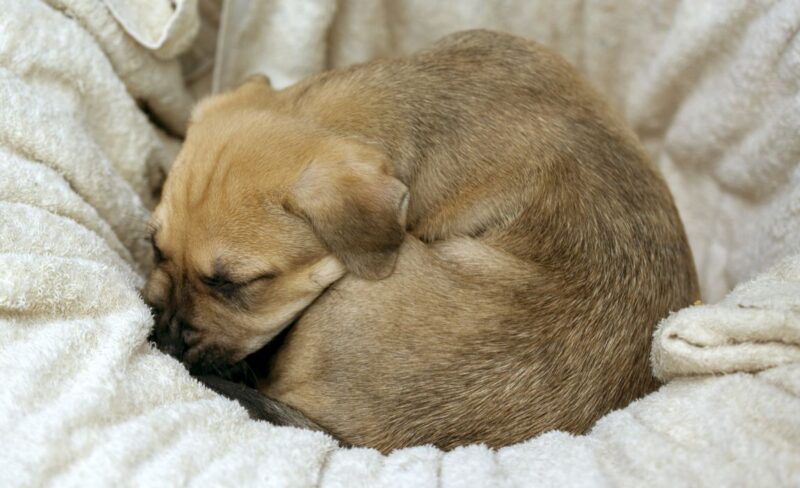
Like us, the majority of dogs are most comfortable indoors, with temperatures between 68 and 72 degrees. This range is cool enough for your puppy to snuggle up without overheating yet warm enough to avoid shivering.
The temperature may need adjusting, however, as puppies are not only smaller than adults, but they also have a bit more trouble regulating their body temperatures.
While temperature extremes can be dangerous for any dog, they’re particularly risky if your puppy is a winter-weather woof with a thick coat like a husky or a brachycephalic (flat-faced) breed like a pug.
16. Maintain a Consistent Routine
Like babies, puppies thrive with a schedule.
A regular routine adapts your puppy to your home and helps with housetraining, crate training, and more. It can also help with spotting issues, such as a change in eating or bathroom habits.
More importantly, a strict routine sets your puppy’s mind and body into a regular pattern, such as winding down and going to bed at a certain time, preventing late-night crying due to boredom or feeding and pottying concerns.
From then on, you know a whining pup at night likely as an upset tummy or other issues worthy of investigation.
17. Provide Your Puppy with a Better Bed

If your pupper isn’t comfy, she may carry on at night to voice her displeasure.
The best beds for puppies cater to your dog’s desired sleeping style, with some pups preferring to cuddle into a ball on a round bed while others enjoy stretching out on a flat, cushioned surface.
In addition to comfort, you definitely want a washable dog bed, as puppies are prone to accidents.
A chew-proof dog bed isn’t a bad idea either since puppies LOVE to chomp. Skip anything with teeth-tempting features, such as visible zippers, decorative tassels, or buttons.
18. Be Consistent with Your Young Canine
Set a plan and stick to it.
If your puppy is to sleep in her crate at night, she must remain in her crate.
That doesn’t mean she sleeps with you on Monday and Tuesday, then suddenly goes back to her crate the rest of the week because she has puppy farts or is too wiggly for your liking. That sends a mixed message.
As with other rules like sitting on furniture, you must establish and follow them consistently. Otherwise, you’ll confuse and frustrate your new fur kiddo.
19. Vet Check for Health Problems
If you’ve tried multiple solutions to no avail or notice any signs of pain or behaviors out of the norm, it’s time to head to your vet with your puppy for an exam.
A vet should also address suspected anxiety, as untreated anxiety can lead to a host of bodily issues, including paw chewing and digestive upset.
One or more of these areas may need adjusting. Trial and error are part of the party with puppies, but if you’re ever at a loss, give your vet a call for some solid advice. Sometimes, we’re too close to the problem to ascertain the solution.
Should I Let My Dog “Cry It Out?”
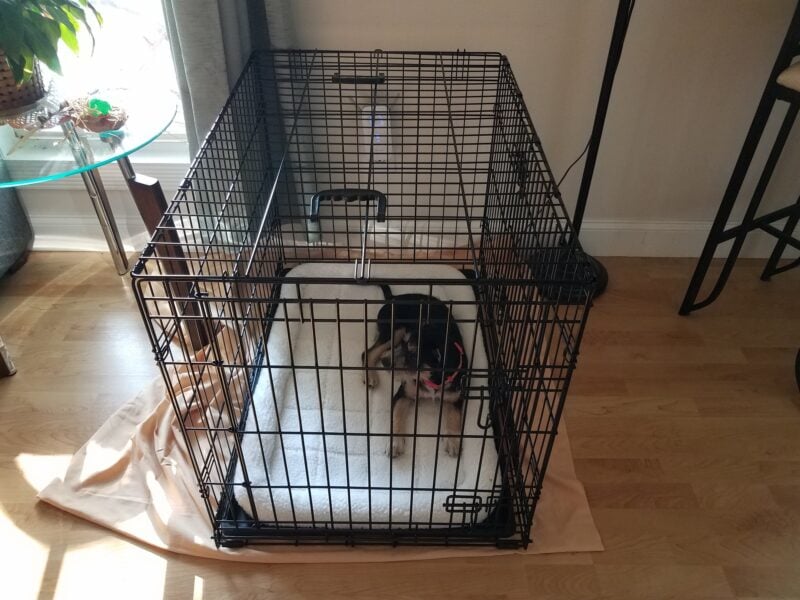
The “cry it out” method isn’t usually recommended with puppies, as ongoing upset can manifest as diarrhea, similar to how a stressed-out pooch gets a sour tummy during a boarding kennel stay.
That’s the last thing you want to clean up in the morning, particularly since puppies have a way of playing slip-and-slide in such messes.
Letting your puppy cry it out can also lead to canine anxiety, which can become a lingering issue that impacts multiple areas of your dog’s life. It can even lead to separation anxiety – a condition known for causing extreme emotional distress, occasionally even causing dogs to injure themselves or destroy the home when left alone.
Do puppies miss their siblings? The answer may surprise you!
Puppy Whining at Night: FAQ
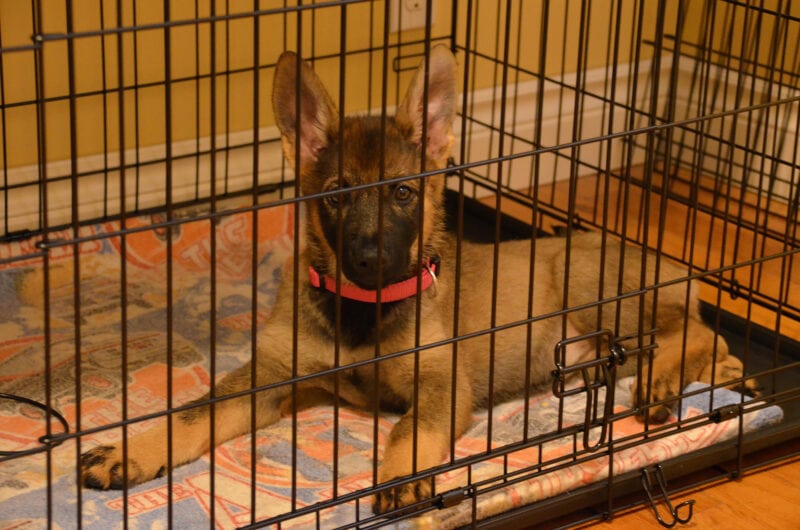
Quieting a noisy puppy at night can be a process with lots of uncertainty as you try to figure out the issue with the added stress of sleep deprivation. Here are the most commonly asked questions and their answers to make it a little easier..
Should I ignore my puppy whining at night?
It’s not recommended to let your puppy “cry it out” at night. If your dog is adjusting to her crate, she may whine for a few minutes and then settle in just fine, but if crying extends beyond a few minutes or sounds truly distressed, it’s time to investigate.
How long does it take for puppies to stop crying at night?
Expect some late-night crying during your puppy’s first few weeks at home. During this time, she’s undergoing a lot of adjustments, and you’re both still figuring out feeding, pottying, and sleeping schedules. She always forgives your missteps (remember when you accidentally bopped her with that toy during play?) so grant her as much leeway as she adapts to her new life at your side.
That said, if your puppy is crying an excessive amount at night without explanation no matter what adjustment you make, it’s time to visit your vet to get to the bottom of her troubles.
Why doesn’t my puppy cry while sleeping during the day?
Your puppy may not cry while sleeping during the day because she’s not crated or because you’re nearby, giving her a sense of security. Your house also isn’t dark and mysterious during the day, making your puppy feel safer if she’s alone.
***
A lack of sleep makes everyone a little cranky, but with a solid plan and patience, you and your puppy will soon sleep peacefully through the night.
Do you have other tips or tricks for new puppy parents dealing with nighttime whining? Did something work well for your fur kiddo? Let us know in the comments. We’d love to hear!
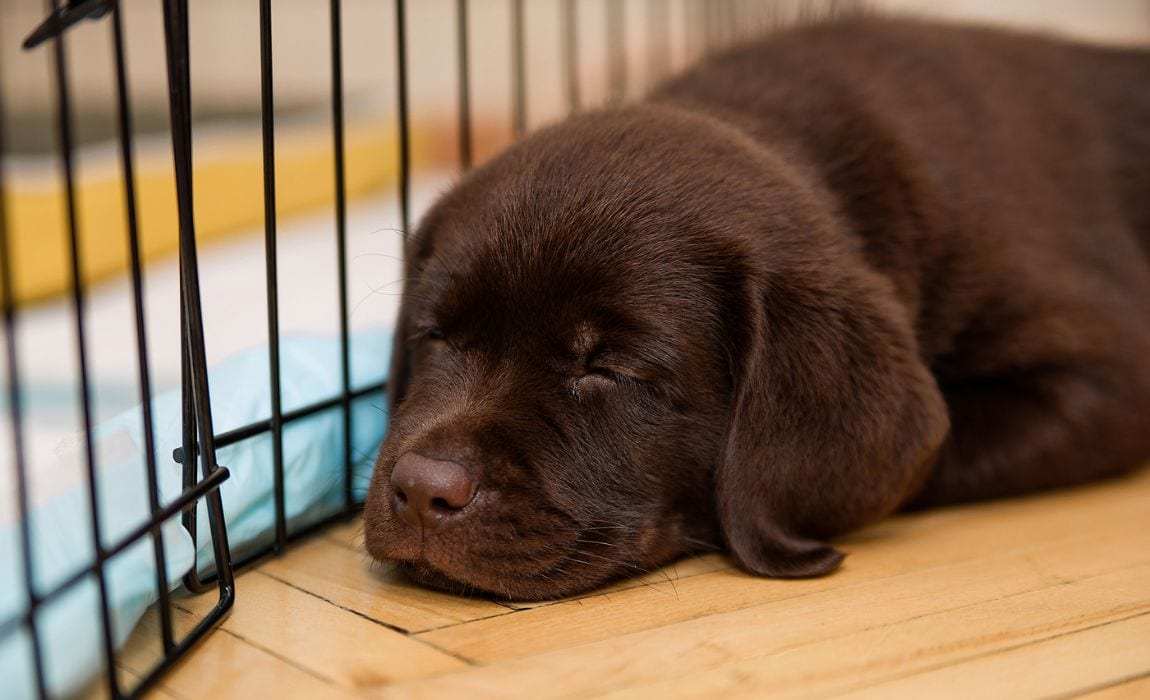

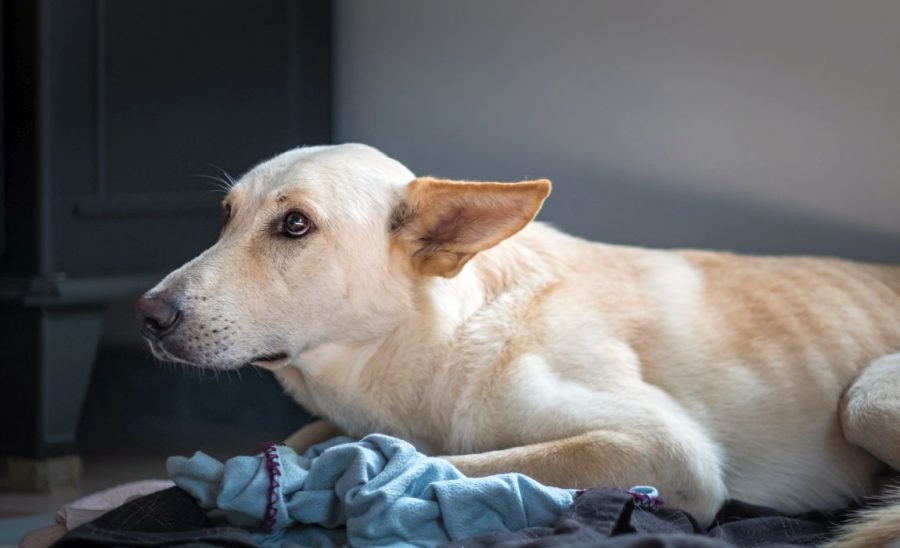


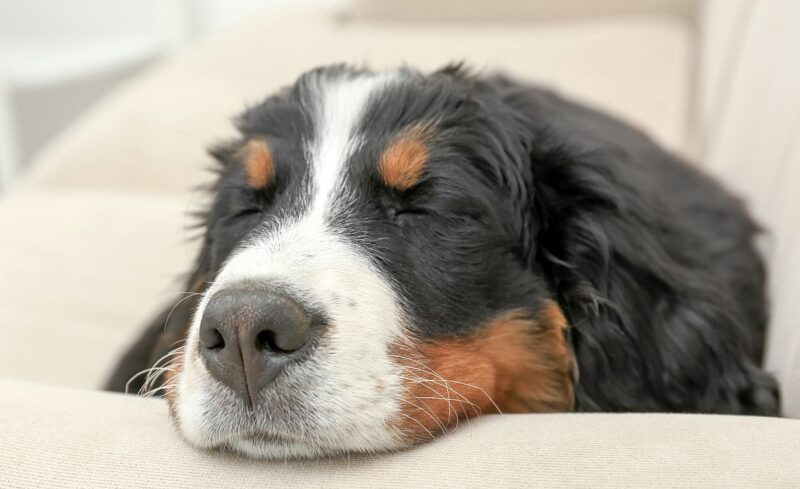

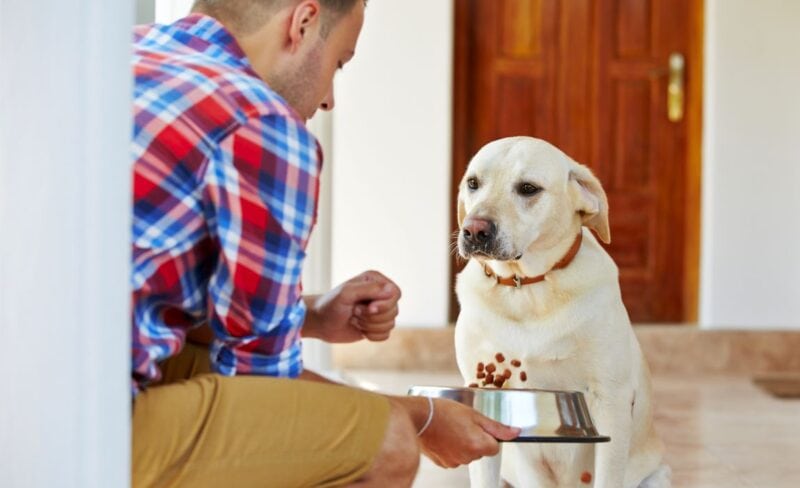
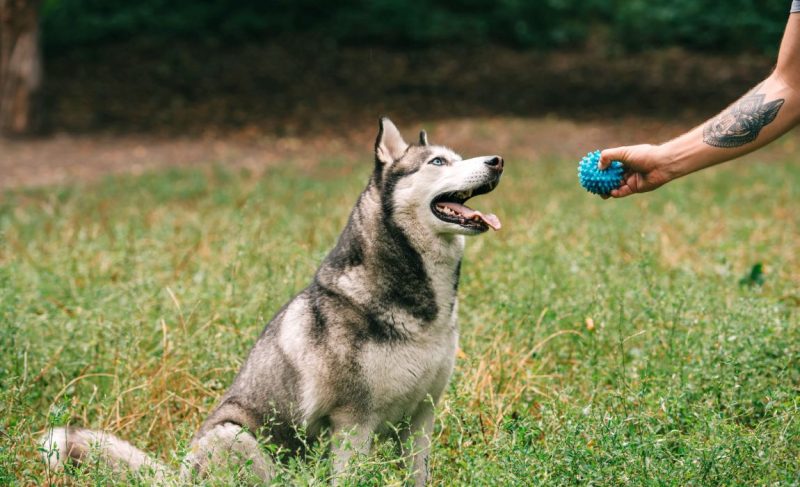

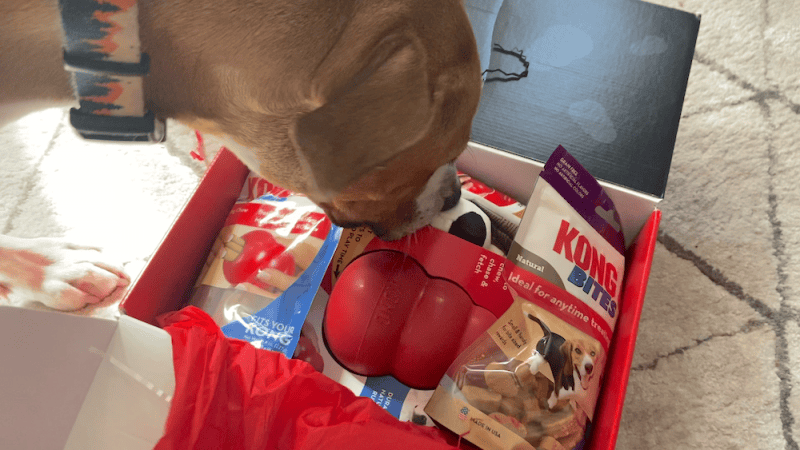
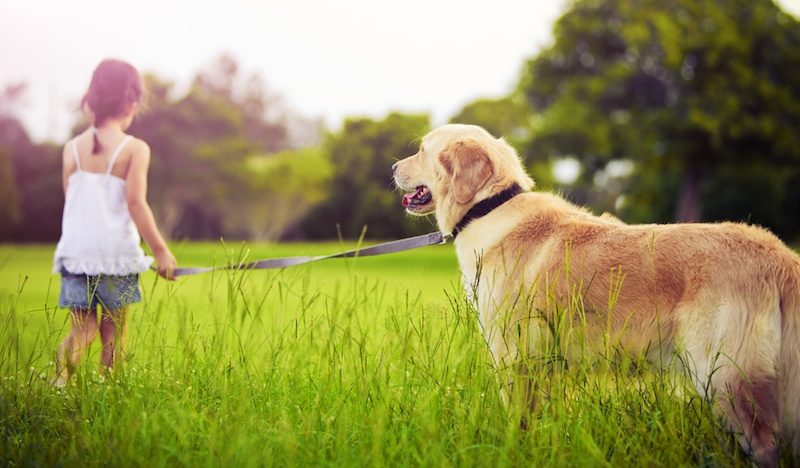

Leave a Comment